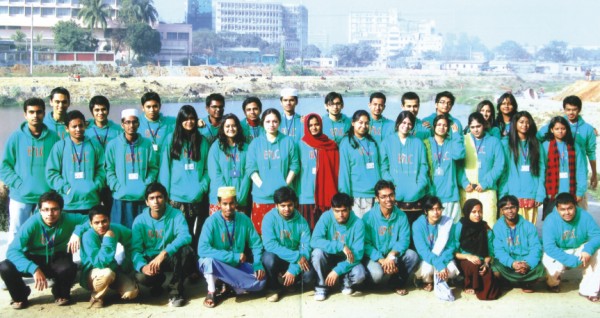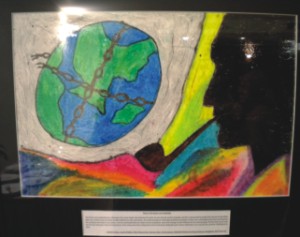Event
Bangladesh Youth Leadership Centre
Graduation Ceremony
Jessica Mudditt
 |
| Participants in the BYLC youth leadership training programme spent two weeks doing community service at Korail slum. |
A youth leadership training programme has brought together students from the three educational systems as a means of fostering interaction rather than division amongst Bangladeshi youth.
It is widely recognised that students at Bangla Medium Schools, English Medium schools, and madrassahs have very little -- if any -- contact with one another. They tend to belong to different socio-economic groups, their families may have different cultural attitudes, and any perceived differences are reinforced by a lack of real opportunities to meet.
However the Bangladesh Youth Leadership Centre believes that a more tolerant, just and inclusive society can only be brought about if young people from different backgrounds work together to achieve change, and it has now successfully run its third month long programme involving students from all three types of schools. The graduation ceremony and an accompanying art exhibition was held last Saturday.
When BYLC first announced its upcoming programme, it received over 600 applications from students from 150 different schools. This indicates that young people are hungry for the opportunity to meet students from a broad spectrum of society. After a series of tests and interviews, 42 bright and energetic students from Bengali Medium Schools, English Medium Schools and madrassahs were selected.
Mohammad Abdullah Al Fahad, 18, from Chittagong said, "It was a great opportunity for me because I hadn't had the chance to meet English Medium or madrasah students before. I am from a Bangla Medium School and I have complex ideas about English Medium and madrassah students. My main idea about English Medium school students is that they are very rich and very ambitious. They study a lot. And I thought that students from madrassahss are different because their education is religious and that they have no contact with women. But I found it very interesting that they communicated with girls during BYLC."
 |
| "The Dream and the Leadership" by Group Rongdhonu. This drawing depicts a leader who observes the world and sees it shackled by people who stay in their comfort zone and fail to take new initiatives within the community. |
Speaking during the ceremony, Khalilullah Md. Bayezid from Tanjimul Ummah Cadet Madrassah spoke of how awed he was by the aims of the BYLC. He said, "Today, when we have reached a point when madrassah students expect neglect at every step, the attempt to unite the three educational systems of Bangladesh is truly unprecedented, not to mention courageous."
"Building Bridges Through Training" involved two weeks of intensive leadership training at BIAM Foundation in Dhaka before the practical component of community service began.
Workshops on leadership, public speaking, teamwork and problem-solving were held, and participants developed bonds of friendship that were clearly visible during the ceremony.
The young people also discussed the concept of leadership - discovering how true leadership is different from mere authority, and they developed their own ideas about responsible and compassionate leadership.
Many distinguished members of society attended the graduation ceremony and shared their insights on good leadership.
Dr Gowher Rizvi, Honourable Advisor to the Prime Minister said: "Contrary to popular belief, real leadership is not about position or authority - it is about creating change in society by positively impacting the lives of others. BYLC's leadership programme is a brave attempt to raise awareness and promote real leadership among Bangladeshi youth."
Stephen Evans, British High Commissioner to Bangladesh said, "History is littered with leaders who lead their countries, companies and armies to destruction, failure and defeat. It's not enough to lead - you have to know where you are taking them and for the right reasons. Leadership must be based on sound values and those values must have a clear ethical dimension."
Dr Atiur Rahman, Governor of Bangladesh Bank, commended the potential shown by participants and urged them to play an active role in politics. He also said that it would be beneficial for research to be undertaken to determine how strong the social divisions are amongst the three educational systems.
BYLC also taught the young people that community service lies at the heart of leadership - and that the leader must be able to serve the community to which he or she belongs. After the training was complete, participants spent two weeks - or the equivalent of 1200 hours - doing community service in Korail Slum in Uttar Badda.
As well as raising awareness about the problems residents face on a daily basis, it was also a vital part of learning leadership through compassion. Khalilullah explains, "We know that slums are a part of our reality - but we ignore them and try to forget them, and just lead our own lives. But with BYLC we went there and actually saw how they live."
The young people held workshops on issues such as water sanitation, adult literacy and cleanliness. Three water filters were distributed as a donation from Water Aid and 13 public waste bins were installed, and a weekly collection service established.
During a health day, doctors gave talks on how to treat and prevent childhood diseases and diarrhoea. Participants also celebrated Victory Day at the slum, entertaining the children with face painting, games and singing.
Sumaiya Ahmed, 18, from an English Medium School in Dhaka said, "I saw firsthand what life in the slums is like. Before I went [to Korail slum] I was just a spoilt brat who doesn't like to eat fish. But when I was there, a child said to me, 'Come to my house and I will make a special fish dish for you. I was so humbled and so I said 'Fine, I will come.'"
Art was also used as a medium to express personal thoughts on Bangladeshi society as a "bigger picture". For Khafilullah, this was a surprising experience - he discovered a "latent talent" in drawing. He said that the programme also taught him how to apply any other skills he may discover in the future.
BYLC's concept and teaching methodology was originally developed at Harvard Kennedy School's Centre for Public Leadership and this programme was supported by the British High Commission in Dhaka.
Copyright
(R) thedailystar.net 2010 |
